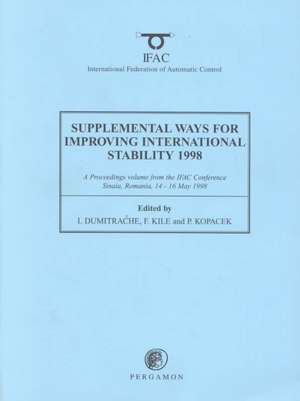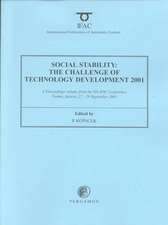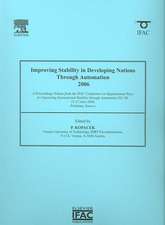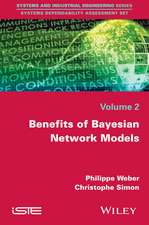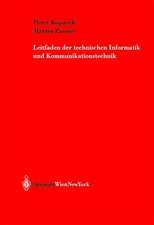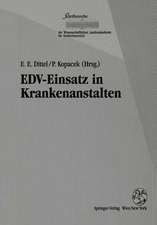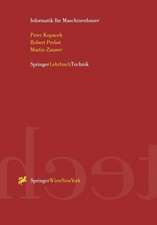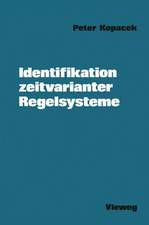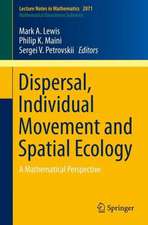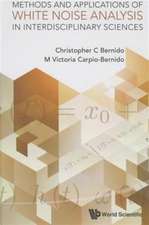Supplemental Ways for Improving International Stability 1998: IFAC Proceedings Volumes
Editat de I. Dumitrache, F. Kile, Peter Kopaceken Limba Engleză Paperback – 10 sep 1998
In the technical program of this conference, 2 survey papers and 19 regular papers - grouped into 8 sessions - were presented. Papers were given in the following areas: Methodological analysis; Investigation of development: stability, sustainable development; Modelling of stability; Application of control principles to international stability; International policy co-operation; Cultural and educational aspects in international stability; East/West/North/South relationships; Global development - regional impact; and Negotiation and mediation in conflict.
Din seria IFAC Proceedings Volumes
- 27%
 Preț: 867.95 lei
Preț: 867.95 lei - 23%
 Preț: 524.55 lei
Preț: 524.55 lei - 23%
 Preț: 640.05 lei
Preț: 640.05 lei - 23%
 Preț: 558.74 lei
Preț: 558.74 lei - 27%
 Preț: 741.03 lei
Preț: 741.03 lei - 23%
 Preț: 491.41 lei
Preț: 491.41 lei - 23%
 Preț: 481.23 lei
Preț: 481.23 lei - 23%
 Preț: 507.61 lei
Preț: 507.61 lei - 23%
 Preț: 682.45 lei
Preț: 682.45 lei - 23%
 Preț: 569.48 lei
Preț: 569.48 lei - 20%
 Preț: 590.37 lei
Preț: 590.37 lei - 23%
 Preț: 427.67 lei
Preț: 427.67 lei - 27%
 Preț: 732.93 lei
Preț: 732.93 lei - 23%
 Preț: 477.99 lei
Preț: 477.99 lei - 23%
 Preț: 506.70 lei
Preț: 506.70 lei - 23%
 Preț: 692.36 lei
Preț: 692.36 lei - 23%
 Preț: 485.96 lei
Preț: 485.96 lei - 23%
 Preț: 501.31 lei
Preț: 501.31 lei - 23%
 Preț: 667.45 lei
Preț: 667.45 lei - 23%
 Preț: 468.63 lei
Preț: 468.63 lei - 27%
 Preț: 779.39 lei
Preț: 779.39 lei - 27%
 Preț: 869.57 lei
Preț: 869.57 lei - 27%
 Preț: 868.97 lei
Preț: 868.97 lei - 27%
 Preț: 873.23 lei
Preț: 873.23 lei
Preț: 440.86 lei
Preț vechi: 572.55 lei
-23% Nou
Puncte Express: 661
Preț estimativ în valută:
84.39€ • 91.69$ • 70.93£
84.39€ • 91.69$ • 70.93£
Carte tipărită la comandă
Livrare economică 21 aprilie-05 mai
Preluare comenzi: 021 569.72.76
Specificații
ISBN-13: 9780080432311
ISBN-10: 008043231X
Pagini: 132
Dimensiuni: 210 x 297 x 7 mm
Greutate: 0.34 kg
Editura: ELSEVIER SCIENCE
Seria IFAC Proceedings Volumes
ISBN-10: 008043231X
Pagini: 132
Dimensiuni: 210 x 297 x 7 mm
Greutate: 0.34 kg
Editura: ELSEVIER SCIENCE
Seria IFAC Proceedings Volumes
Cuprins
Chapter headings and selected papers: Survey Papers. Sustainability, peace, and future leadership (F. Kile). Political, economic and military evolution of instability, North Korea, 1945-1998 (J.G. Richardson). Stability. Virtual enterprise - a strategical approach to improve socio-economic stability (I. Dumitrache et al.). Social entropy, technological change and international stability (S. Dobrescu, R. Dobrescu). Stability of ecological economic linear models (sensitivity analysis) (A. Mironychev). A systems approach to understanding the causes of instability in nations: a case study (M.A. Hersh). Modelling. A dynamic-game model of cooperation in energy and climate change (S. Pickl, J. Scheffran). Object oriented model to support early warning and rapid reaction planning in international context (V.M. Shalamanov, T.D. Tagarev). A behavior model for preventive health practices (G. Simion). Acts of mathematics with hierarchical haze (S. Novikava , A. Zhybul). Artificial societies: a new paradigm for complex systems' modelling (M. Dascalu et al.). Methodologies. Stability versus uncertainty (V. Ionescu). Geopolitical relations in post USSR Europe as a subject of mathematical modelling and control (S. Levkov, A. Makarenko). Demographical units in hierarchical coordinates: construction, activity and goals (W. Nowik et al.). Art in state constructing process (A. Burawkin et al.). Practical instance of state design in reconstructing region (P. Buka et al.). East-West academic cooperation within the framework of TEMPUS-PHARE program (O. Pastravanu, M. Voicu). For higher flexibility on the labour market (M. Kalaidjieva). International Policy Cooperation. Gains from international macroeconomic policy coordination under alternative objective functions (G. Haber et al.). Sway of new time: general lines (F.O. Kile et al.). Author index.
